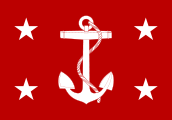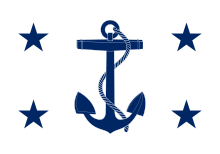James Kirke Paulding
| James Kirke Paulding | |
|---|---|
 | |
| 11th United States Secretary of the Navy | |
|
In office July 1, 1838 – March 4, 1841 | |
| Preceded by | Mahlon Dickerson |
| Succeeded by | George E. Badger |
| Personal details | |
| Born |
August 22, 1778 Pleasant Valley, Dutchess County, New York, US |
| Died |
April 6, 1860 (aged 81) Hyde Park, New York, US |
| Political party | Democratic-Republican |
| Spouse(s) | Gertrude Kemble |
| Profession | Politician, writer |
James Kirke Paulding (August 22, 1778 – April 6, 1860) was an American writer and, for a time, the United States Secretary of the Navy.
Biography
James Kirke Paulding was born on August 22, 1778,[1] at Pleasant Valley, New York. Paulding was chiefly self-educated.
He became a close friend of Washington Irving. With Irving, Paulding proposed a literary project. As he described, "one day in a frolicsome mood, we broached the idea of a little periodical merely for our own amusement, and that of the town, for neither of us anticipated any further circulation."[2] The result was Salmagundi; a short-lived satirical periodical, from which the word 'Gotham' was first ascribed as a name for New York City.[3]
Along with Irving, Paulding was associated with the "Knickerbocker group", a group which also included William Cullen Bryant, Gulian Crommelin Verplanck, Fitz-Greene Halleck, Joseph Rodman Drake, Robert Charles Sands, Lydia Maria Child, and Nathaniel Parker Willis.[4]
Paulding's other writings also include The Diverting History of John Bull and Brother Jonathan (1812), a satire, The Dutchman's Fireside (1831), a romance which attained popularity, a Life of Washington (1835), and some poems. In the decade before Washington Irving and James Fenimore Cooper achieved popular success, Paulding experimented in every genre in an effort to forge a new American literature. Thereafter, his outstanding contributions were in the novel and in a stage comedy. Koningsmarke (1823), which he began as a spoof of Walter Scott's historical romances, took unexpected hold of his imagination and became a well-turned novel, notable for its portrait of an old black woman that anticipates William Faulkner and for its sympathetic yet unromanticized depiction of the Indian. The Lion of the West (1831), selected in a play competition in which William Cullen Bryant was one of the judges, presented a cartoon of Davy Crockett; it was the most-often performed play on the American stage before Uncle Tom's Cabin, and an altered version enjoyed success in London. Paulding's View of Slavery in the United States (1836) was a comprehensive defense of both Black slavery and America's claim to be a bastian of liberty against the attacks of abolitionists and European critics.
Among Paulding's government positions were those of secretary to the Board of Navy Commissioners in 1815–23 and Naval Agent in New York in 1824–38. President Martin Van Buren appointed him Secretary of the Navy in June 1838. As Secretary, he was a conservative figure, whose extensive knowledge of naval affairs was balanced by notable lack of enthusiasm for new technology. He opposed the introduction of steam propelled warships declaring that he would "never consent to let our old ships perish, and transform our Navy into a fleet of (steam) sea monsters." Nevertheless, his tenure was marked by advances in steam engineering, wide-ranging exploration efforts, enlargement of the fleet and an expansion of the Navy's apprenticeship program.
Paulding left office with the change of administrations in March 1841, returned to literary pursuits and took up agriculture. He died at his farm near Hyde Park, New York. He is interred at Green-Wood Cemetery in Brooklyn, New York.
USS James K. Paulding (DD-238) was named in honor of Secretary of the Navy Paulding.
Oft-quoted phrase
Paulding's story, "The Politician" contains a maxim that is often attributed to Samuel Gompers: "Reward your friends and punish your enemies." The story appears in his collection, Tales of the Good Woman, by a Doubtful Gentleman. The same basic idea (a definition of justice as doing good to friends and harm to enemies), appears in Plato's dialogue, the Republic, where it is subsequently rejected as inadequate.
Important works
- 1807–1808 – Salmagundi (with Washington Irving)
- 1812 – The Diverting History of John Bull and Brother Jonathan
- 1813 – The Lay of the Scottish Fiddle
- 1818 – The Backwoodsman
- 1820 – Salmagundi. Second Series
- 1822 – A Sketch of Old England by a New England Man
- 1823 – Koningsmarke, the Long Finne
- 1825 – John Bull in America, or the New Munchausen
- 1826 – The Merry Tales of the Three Wise Men of Gotham
- 1828 – The New Mirror for Travellers
- 1829 – Tales of the Good Woman, by a Doubtful Gentleman
- 1830 – Chronicles of the City of Gotham
- 1831 – The Dutchman's Fireside
- 1832 – Westward Ho!
- 1835 – Life of George Washington
- 1836 – View of Slavery in the United States
- 1837 – The Book of St. Nicholas
- 1838 – A Gift from Fairy Land
- 1846 – The Old Continental, or the Price of Liberty
- 1849 – The Puritan and his Daughter
References
- ↑ Nelson, Randy F. The Almanac of American Letters. Los Altos, California: William Kaufmann, Inc., 1981: 45. ISBN 0-86576-008-X
- ↑ Jones, Brian Jay. Washington Irving: An American Original. New York: Arcade Publishing, 2008: 57. ISBN 978-1-55970-836-4
- ↑ Burrows, Edwin G. and Mike Wallace. Gotham: A History of New York City to 1898. (Oxford University Press, 1999), 417.
- ↑ Nelson, Randy F. The Almanac of American Letters. Los Altos, California: William Kaufmann, Inc., 1981: 30. ISBN 0-86576-008-X
Sources
| Wikisource has original works written by or about: James Kirke Paulding |
 This article incorporates text from a publication now in the public domain: Cousin, John William (1910). A Short Biographical Dictionary of English Literature. London: J. M. Dent & Sons. Wikisource
This article incorporates text from a publication now in the public domain: Cousin, John William (1910). A Short Biographical Dictionary of English Literature. London: J. M. Dent & Sons. Wikisource This article incorporates public domain material from websites or documents of the Naval History & Heritage Command.
This article incorporates public domain material from websites or documents of the Naval History & Heritage Command.- This article incorporates text from the public domain Dictionary of American Naval Fighting Ships.
External links
| Government offices | ||
|---|---|---|
| Preceded by Mahlon Dickerson |
United States Secretary of the Navy 1838–1841 |
Succeeded by George E. Badger |
| |||||||||||||||||||||||||||
|


